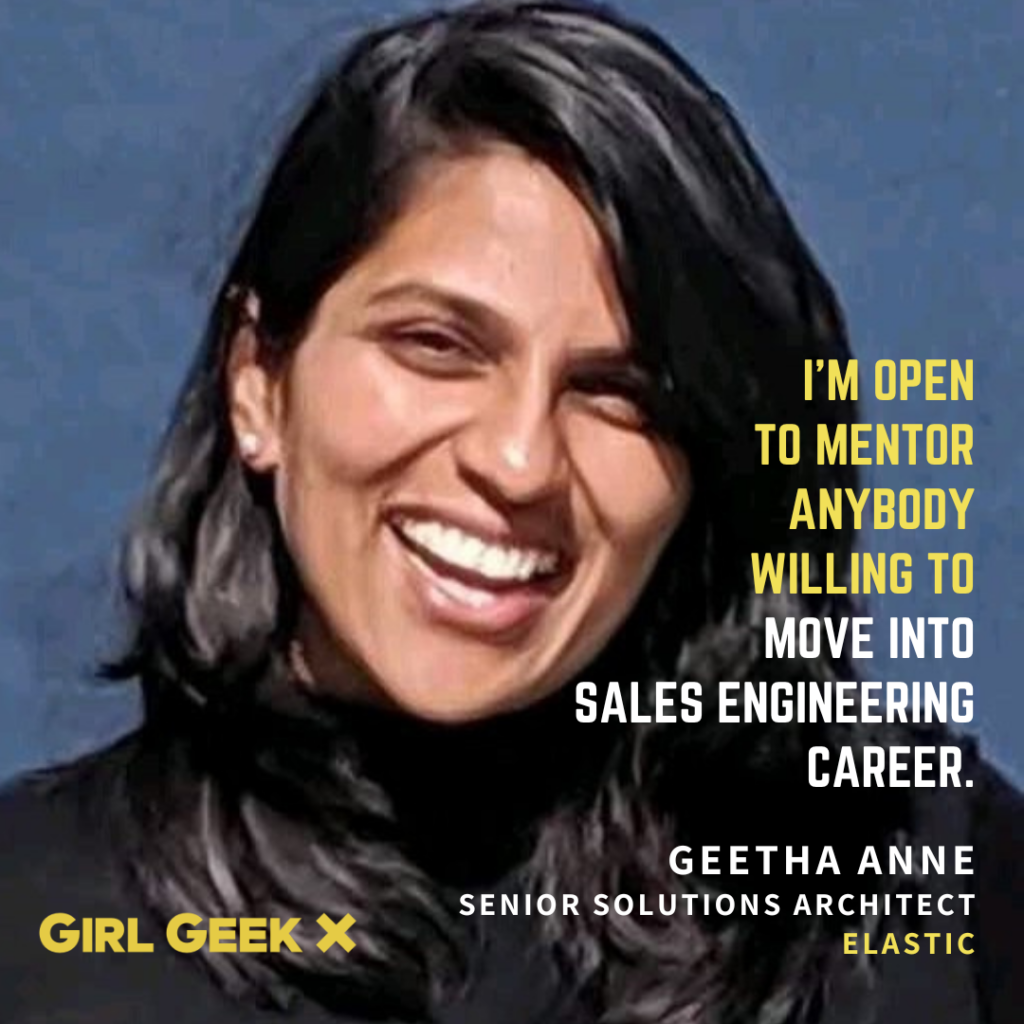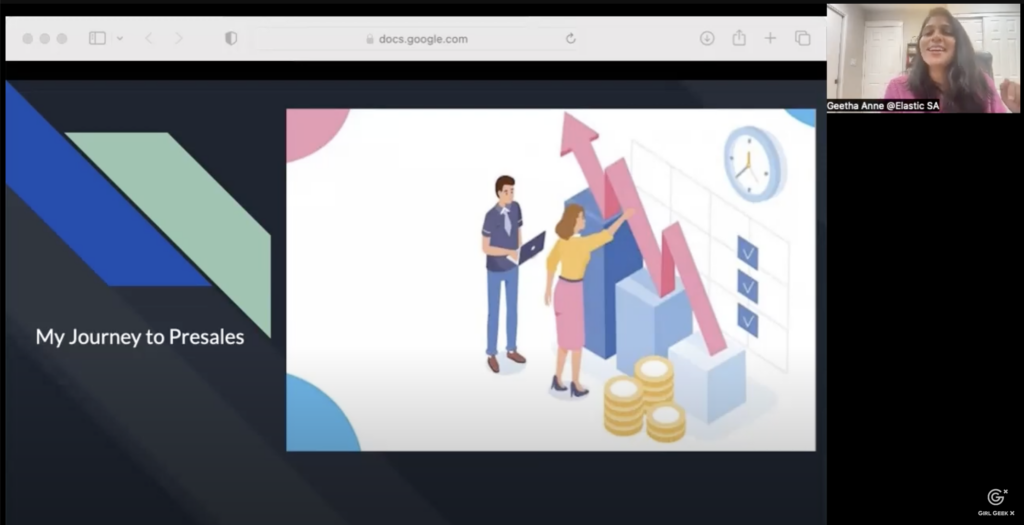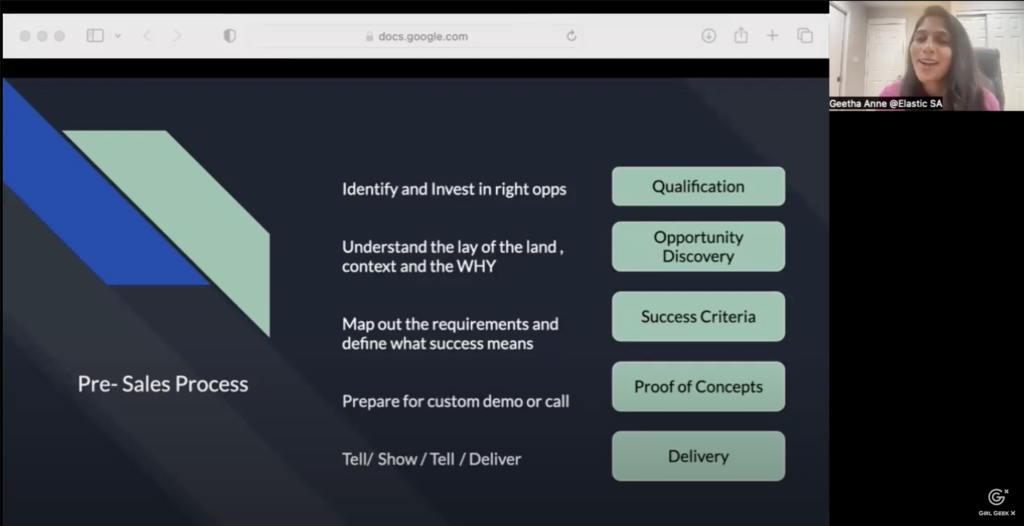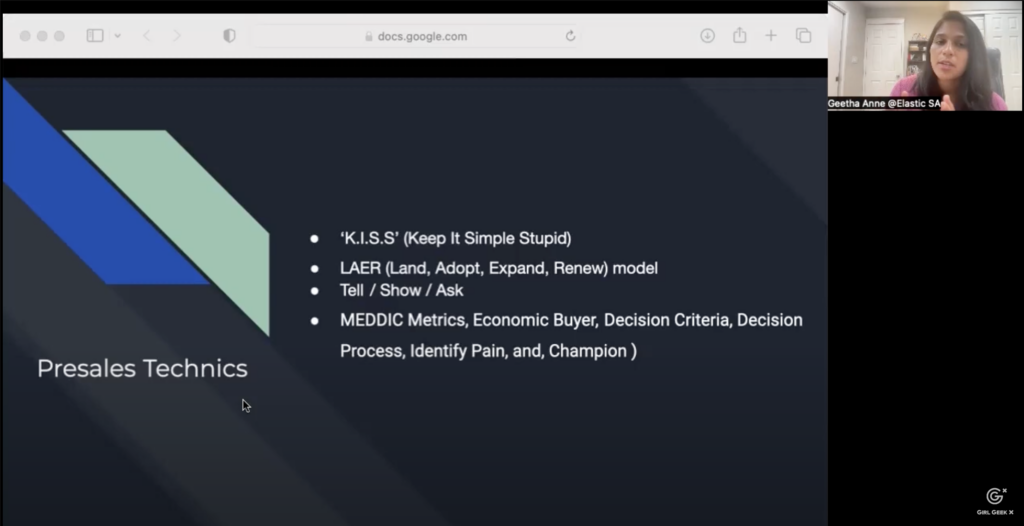VIDEO
Geetha Anne (Senior Solutions Architect at Elastic) believes that if you have the drive and interpersonal capability to tell great stories, a software engineer in sales is a dream combination! With in-depth product and system knowledge that computer engineering background, you can become an expert sales engineer who adds value to the customer’s experience and accelerates deal closure. She shares her personal journey from writing code to furthering a career in the sales engineering world. Are you a software engineer with keen interest in business? Have you ever considered a career in technology sales?
Like what you see here? Our mission-aligned Girl Geek X partners are hiring!
- Check out open jobs at our trusted partner companies.
- Watch all ELEVATE 2023 conference video replays!
- Does your company want to sponsor a Girl Geek Dinner or Career Fair? Talk to us!

Geetha Anne: Hi, everyone. Thank you so much for your time today. My name is Geetha. I am a solutions architect at Elastic. Today, the topic of discussion for the session is how do you start at building a career in sales engineering if you’re already a software engineer? And how can you go about scaling your career in the sales engineer (SE) world? First, I’d like to extend my thanks to the Girl Geek X community for this incredible opportunity. I’ve been a long time follower and I’m so excited to speak on this platform today.
Geetha Anne: Before we get into the topic, a bit about myself. As you can see, I am South Indian. I currently live in the SF Bay Area in California with my family, two daughters, nine and six, they are. My husband who’s also in the tech. I’m in California, so I’ve inherently got in the habit of hiking and I love hiking. I recently finished this Half Dome Summit, which is for me, it’s a great accomplishment because I’ve suffered from an extreme case of acrophobia and I was able to overcome that fear by submitting Half Dome recently.
Geetha Anne: On the right, you see my picture from my graduation day, I did software engineering from San Jose State University back in 2015. That’s my daughter when she was one year old, when I graduated. Before I moved to the US I used to work as a software engineer at Tata, and then I moved here, did my Master’s, and I started off as an intern at ServiceNow in software engineering. Got a full-time as a software engineer, and then after a few months at ServiceNow, I accidentally discovered something called pre-sales exists.
Geetha Anne: Back then in 2015, it was still a niche area for infrastructure backed companies to have a pre-sales function. I was really apprehensive, but I started loving that role ever since. So I worked at Cloudera, Confluent and Elastic recently. As a software engineer, my mind used to work like this. It’s an exact representation of how my mind would function and think like when I was an engineer. Maybe some of you can relate to this because I had technical knowledge, I had creativity, curiosity, but was wet behind the ears in terms of experience.
Geetha Anne: When I was chasing technical knowledge and creativity, I would lose out on curiosity and experience because curiosity will be killed when you follow a monotonous routine, which is usually the case in these SDLC life cycles. You follow the rules that were set in by others and then you lose the curiosity side.
Geetha Anne: I did have inherent curiosity and creativity, but then I did not have the right amount of technical knowledge in order to implement my curiosity and creativity into a real existing, real executable program or a project because I didn’t have experience. Putting all these diagrams together, I was looking for that magic to happen, which never happened when I was a software engineer because I was lacking one or the other.
Geetha Anne: In order to kickstart my journey, in order to really propel my career in software engineering, I read a lot of books. On all these books on the screen you see like Mythical Man-Month, the Pragmatic Programmer, and all of the great books you see on the screen, they give you a perspective to think of software engineering as an art form rather than a science.
Geetha Anne: As with painters, when you draw parallels between art and software engineering, as with painters, I’ve seen so many software developers who only replicate things and really never come up with something original. I was someone like that. I used to be a great painter, a great engineer who replicated things, who really created projects that were similar to others and did a great job at it. But what many other software developers in the organizations were like this genuine artist who are different. They came up with new things, they set new standards for the future. They changed the current environment to me and the status quo for the better, and all the great things they could achieve as these really passionate quarters and programmers, which I was not. I was not a passionate programmer.
Geetha Anne: I did know programming well enough to read code, make the changes, and really suggest optimization techniques and whatnot, but I was really not into it. And then reading all these books taught me to think pragmatically, to present a collection of tips to improve the development process, how to think in a pragmatic way then a theoretical way. I also became an early adopter of inquisitiveness and critical thinking and realism.
Geetha Anne: That set me on a path to define set rules for myself, a guardrails for myself. Like if I were to stay in the software engineering role, I will have to do these things, X, Y, Z things. And the first thing was grasping the fundamentals for the long-term benefit. That was one thing I told myself. This can be elementary as it can appear at first, but having a solid foundation in fundamentals will always need to be, it should come first.
Geetha Anne: The better you understand, the easier it becomes when you’re going onto these advanced concepts. I also set myself a rule that I will learn by doing. I always play with the code while learning. The sooner I started playing with the code, the better I got and faster at learning these given advanced topics. Fiddling around with this code made me realize that I’m capable of not only changing this code, but maybe create my own code when required.
Geetha Anne: I also learned quite a bit from bugs. Bugs, they are inherently going to appear in software programs when you write, right? They are part of fully acceptable process and a phenomenon, and it’s a commonly occurring situation that bugs occur. I’ve learned quite a bit from my own bugs as a software engineer, but it was not fulfilling enough. I really needed that new avenue.

Geetha Anne: I wanted to learn what’s happening on the other side of the fence, what’s happening in business. I always was inquisitive. I wanted to see what goes in that realm, but I didn’t know where to start. But there was this miraculously an opportunity showed up when I was at ServiceNow. They wanted someone to demo the project at a sales kickoff that I was part of.
Geetha Anne: I didn’t really know what sales kickoff meant at that time, but I signed up for that opportunity because no other engineer was willing to go to Florida. I signed up for that opportunity and fortunately that worked in my favor because it opened doors for so many things in my life that my career has completely transformed from then on.
Geetha Anne: I was there in Florida at the sales kickoff. As I was demoing the product and interacting with my sales peers at the time, I’ve learned incredible life lessons in professional way. I’ve learned that sales actually plays such a crucial and important role in every business. I was so late in the game to understand that. I really did not have a full picture of what’s going on in the organization.
Geetha Anne: I came about to understand that there’s no matter how good your operations are, how cutting edge your technology is, how good of a programming prowess or engineering prowess you have, and how tight your financial goals are, how progressive and forward-thinking your management and engineering techniques are, you still will need a great sales mechanism in place in order to make any business profitable.
Geetha Anne: After that particular day, some switch flicked in my brain and I started researching more and more about sales and I came across this quote, which is my favorite. “Nothing happens, nothing really happens until someone starts selling something.” That’s when every transaction starts, every enablement starts, and everyone starts to know what’s in the world out there.
Geetha Anne: Once that realization came to me, I started researching and I found that there are majorly two roles across every business in every industry. It is primarily sales and sales support that will make you profit, that will make any business profitable. Every other business function is redundant if sales team fails.
Geetha Anne: If sales fail to sell a product or a service, it will lead to cascading effect of generationally failing income cashflow and also other functions failing in a business. You should take it seriously that there is no other department or business function that can have a greater impact on the development of all cash flows, all important cash flow than the sales or for that matter marketing department.
Geetha Anne: When that realization came, I started research about pre-sales. What is pre-sales? In my opinion, pre-sales is this awesome function within any sales led or a product led company, which is about empowering and educating your buyers, prospects and customers.
Geetha Anne: Pre-sales means it is as simple as guiding your product buyers through their buying journey and proactively anticipating challenges that might occur. It is far more than technical sales. You will have to know about the solution in and out as a sales engineer, as a pre-sales engineer, it is knowing your buyer’s needs ahead of time and you being the expert in the room, you will help them successfully advance to the finishing line of the deal. This is a responsibility of the sales engineer.
Geetha Anne: And if you aren’t from the sales industry, the term pre-sales will apply to all activities before the sales event starts. That’s why the pre in pre-sales comes from. And then by definition, pre-sales will include all marketing and lead generation up to sales qualified lead.
Geetha Anne: Is there need for pre-sales engineers in the market right now? The answer is a big yes. This is the case decade ago. It has only become extremely crucial to hire more pre-sales in a product led or a sales led growth companies. The way it works is once a sales organization sets a sales qualified lead, this sales team will work in converting the lead internal opportunity. Then you work on that opportunity to closure, to win the deal, and all of that activity. In this process, the sales reps are focused on working on the opportunity.
Geetha Anne: There are so many areas where the technical resources are needed and the assistance is required in winning that opportunity. This is where the sales engineer or the SE comes into play to save the day. The activities performed by sales engineers include early demonstrations, technical discovery, comprehensive tech demonstrations, filling something or as request for RFIs, request for proposals, technical validations, which are typically the most resource intensive part of an SE journey, often referred to as proof of concepts and proof of value. These are the responsibilities as a sales engineer, you have to analyze and come up with a solution that fits the needs of a customer.

Geetha Anne: And as a profession, it’s developed in a technology sales environment where the product and service offerings are extremely complex. It’s not like you’re buying a car where there’s only one person needed to sell and the product is easy to understand and there’s only one decision maker. That’s not the case with selling a complex IT or a SaaS or infrastructure-based technical solution.
Geetha Anne: You often need multiple teams and parts of business are involved, stakeholders are involved in decision making when you close the sale. And in order for that to happen, the pre-sales has to cover a lot of activities that take place. First thing is qualification. You will have to identify and invest in the right opportunities and then you have to… And the SE has to perform.
Geetha Anne: The sales engineer has to perform the opportunity discovery, understanding the landscape of that customer, understanding the context and why they’re seeking the solution from us as a company. And then you map out the requirements of customer to the solutions that are offered by the company. You come up with a success criteria and define and cater, tailor or custom make a demonstration that will cater to the needs of the customer. And then finally deliver on all of these things that are promised after the pipeline is generated. You answer the RFPs, do the internal research, come up with a proof of concept and deliver. This is all in the hands of a pre-sales engineer.
Geetha Anne: But how do pre-sales engineers go about doing it? You don’t have to do it, there are so many frameworks that are in the market that will help you do that. The first one is K-I-S-S principle, which is very simple, which will help the customers to be told what they’re going to be told. Like the sales engineer is going to tell them what they’re going to tell and they’re going to tell what they’re going to do next and they’ll repeat what they’re told already and keep it very simple. And they’ll repeat the process of keeping them completely informed on where they’re going and how they’re evolving in the journey of customer success.
Geetha Anne: And the next one is LAER model, which is a successful framework used in managing objection handling, when it comes to pre-sales software sales. There’s so many objections that come up in business related contexts like price related objections. There’s quality of service risks that customers are worried about, and there’s relationship and trust-based credibility issues or legitimacy issues that customers are worried and raise an objection about.

Geetha Anne: You can use this LAER methodology in order to overcome that fears that they have. And there are many other techniques like MEDIC, which is a sales qualification framework used by a lot of salespeople to help qualify the sales using certain metrics like who are the economic buyers, who’s the decision criteria based off of, and what’s the decision process? What is exactly the pain point and who’s the champion?
Geetha Anne: After understanding all of this, you will come to terms, you’ll also understand the responsibilities and know what to expect in an SE role. You will have to equip yourself as an SE with certain competencies. The first thing being, so in order to be a successful SE, you need a lot of skills that are very much soft skill based. The first thing is communication skill, which is a presentation skill. In other words, you are the face of the customer, right? You are the face of this company in front of the customer, so you will have to have innately the ability to create high value presentations of the company you’re representing.
Geetha Anne: When you start as a junior SE sales engineer and you grow and work your way up to the level five as an SE or a staff or a principal SE, your responsibilities are growing. At first, you’re only expected to understand the audience, create a messaging that caters to them, and deliver those demonstrations.
Geetha Anne: As you grow up, as you work your way up, you will be expected to be extremely skillful and create a compelling case for why the customer has to buy your product. And your ability to deliver compelling messaging, your depth of knowledge, breadth of knowledge, and your ability to speak to a multitude of products, disparate concepts will matter and you will be sought out as a high value presenter. And you’re expected to be on your own when it comes to demonstration skills, when you’re going from level one to level five as an SE.
Geetha Anne: The technical acumen is a non-negotiable skill every sales engineer is expected to have. Because imagine this, right? You are standing in front of the customer representing a product and a company. Your familiarity, your depth of knowledge, and your complex understanding or in-depth understanding of a product in a range of technical topics on that product will only position yourself for success. And you are offering so much value right away and you’re bringing so much to bear already.
Geetha Anne: You are familiarizing yourself with the core products. You are positioning yourself as an expert in this particular technology. You will be having will be expected to have ability to troubleshoot the technical issues. You will also master all this one step at a time.
Geetha Anne: At one point you’ll become an SME of some category of the product and you’ll be capable of running your own meetings, creating your own demos, proactively applying all the emerging trends, and advancing your sales and differentiating from the competitors. Creating competitive materials and making it repeatable is another skill you will also hone.
Geetha Anne: Another skill that’s important is relationship management because you are dealing with salespeople here. You are on a daily basis sharing your knowledge, understanding the landscape. You are constantly evolving these processes. Whenever there’s money involved, it has to be dealt very, very carefully.
Geetha Anne: You have to have exceptional process and project management skills. You don’t have to have it right away, but you are expected to learn as you grow in front of these customers. You’re answering these complex RFPs, you’re presenting topics that are disparate. You will have to become a trusted advisor and their own champion in order to gain trust and credibility.
Geetha Anne: What are the great qualities of an SE? I’ve observed that a great SE is a business operator, meaning, which they view every opportunity as an incredible way of winning that particular account. Their win rates for opportunities of SEs are extremely high, and they’re also people developers, meaning which they contribute back to the SE world by creating tech enablement and all the on-boardings and trainings and creating other kinds of value creation avenues like videos, blog posts, and also articles.
Geetha Anne: And then, after all that, we’ve seen the competencies. There’s a career path for every SE. Most companies replicate this pattern that you’re seeing on screen. They start off as an SE, then there’s a promotion that happens to senior SE and there are two pathways you can take from there. One is become an individual contributor or you can go in a management pathway and manage other sales engineers. The max you can go is a principal SE, and from there you can pivot to management whichever way you want, which is very similar to software engineering, but slightly different in terms of your expectations and how you progress in each level will define where you will find yourself a suitable fit.
Geetha Anne: Above all, topping all this, you need a great mentor. I highly recommend finding a good mentor. First, outline your professional goals. Seek a mentor within the organization or externally who can align with your professional goals, and you can establish a connection with that person and then develop a mutually beneficial relationship. I’m open to mentor anybody who’s willing to move into sales engineering career.
Geetha Anne: These are some of the resources that helped me put together this. And also in my day-to-day job, I refer to these books and resources on a regular basis. Thank you so, so much for this opportunity and I hope to meet some of you on my LinkedIn and great, I hope you enjoy the rest of the conference. Bye.
Like what you see here? Our mission-aligned Girl Geek X partners are hiring!
- Check out open jobs at our trusted partner companies.
- Watch all ELEVATE 2023 conference video replays!
- Does your company want to sponsor a Girl Geek Dinner or Career Fair? Talk to us!


